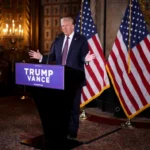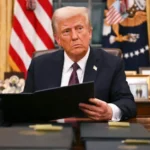“You have to make the argument to Trump, ‘Do you want this on your legacy, that you lost the first war of the 21st century to Vladimir Putin?’” Johnson said. “It’s going to be worse than Vietnam or Afghanistan.”
Ukrainians are not outright opposed to the idea of negotiating with Russia. In fact, some view Trump’s return and his push for diplomacy as an opportunity. Ukraine is outmanned and outgunned. Russia’s attacks on civilians are increasing. Thousands of North Korean soldiers have joined its ranks. Ukrainians recognize that the current path is unsustainable.
But to reach a negotiation that doesn’t empower Putin and signal American weakness, Trump will need to adopt an approach that includes supporting Ukraine militarily and economically, even if it goes against the instincts of his MAGA base, Johnson said. Otherwise, Putin will take advantage of Ukraine’s weakness to claim even more territory, perhaps even toppling the government in Kyiv.
“You’re going to have inherited something where there was a chance that a country was going to be free and independent, and [instead] you’d end up with a Russian slave state, and you’ll never come back from that,” Johnson said. “Then it’s the first big defeat for NATO in 80 years. It’s a massive reverse for America. It’s a humiliation for the West. And it’s happened on your watch. Whatever happens the rest of your presidency, you’re never going to get over it.”
Johnson is not the only European conservative in Trump’s orbit who supports Ukraine. Italian Prime Minister Georgia Meloni is an ardent Ukraine supporter. Certainly, Russian-leaning conservative leaders such as Hungarian Prime Minister Viktor Orban seem to have Trump’s ear. But Trump has also spoken with both Ukrainian President Volodymyr Zelensky and Putin since the election, which suggests he is collecting a range of views.
House Speaker Mike Johnson (R-Louisiana)
said last month that he “doesn’t have an appetite” for passing more Ukraine aid through Congress. But there are still dozens of Republican lawmakers who support Ukraine, including the chairs of the House Intelligence Committee, House Foreign Affairs Committee and House Armed Services Committee. Rep. Mike Waltz (R-Florida), Trump’s chosen national security adviser,
recently advocated for increasing pressure on Putin to bring him to the negotiating table. Trump’s
presumed secretary of state choice, Sen. Marco Rubio (R-Florida), has
called for a negotiated settlement to the war, but not on terms favorable to Moscow.
To many in Trump’s base, Ukraine is symbolic of the “globalist” interventions they see as contrary to America’s interests. But Trump’s team should look beyond the political noise and consider what’s truly at stake. If Trump withdraws support now, it would send shock waves throughout Europe. And beyond Europe, autocrats worldwide — Chinese President Xi Jinping included — would see that America’s “commitments” to its allies are conditional, inviting more aggression.








